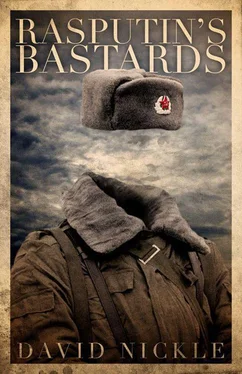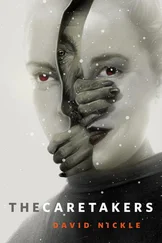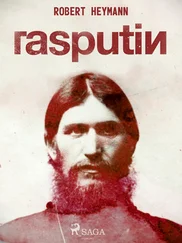“We’re family, are we?” he said, lifting a duck and letting it fall back into the ice. In the air, old Rebroff was starting on the Natascha song again, from the beginning.
The girl came around the counter. She was wearing a dark, patterned skirt to her ankles.
“You have just arrived? No. You’ve been here long enough to know better than to ask that.”
Alexei nodded. “Right,” he said. He looked to the ceiling and behind the counter.
“Where is your stereo?” he said as Rebroff sang on.
The girl smiled. “Same place as the cash register,” she said. “We don’t need one.”
“Ah.”
“Now let me ask a question,” she said. “Two questions.”
“All right.”
“What is your name, sir?”
Alexei smiled. “Alexei,” he said.
“Hello Alexei. I am Darya.” She extended her hand. He shook it. “And your second question?”
“Were you a killer?”
Alexei let her fingers slip from his. “A—”
“I only say, because you don’t look like a university professor or a lawyer, or much of a politician. Did you kill for them?”
Darya was flushed as she spoke. Alexei looked back at her levelly.
“I have my suspicions,” he said.
She nodded and smiled. “I thought so. It’s good. It’s good. I’m told that I’m getting an eye for this kind of thing. Maybe one day, you think I can become one with the dream-walkers? Babushka used to tell me I’d make a good dream-walker.”
Alexei went to the front door of the shop. He looked out into the street. A small group of tourists walked along the road. “Dream-walkers,” he said. “I don’t know about that.” Then Alexei remembered something the Koldun said earlier: he was going to prepare for the “dance” tonight.
“Are you going to the dance?” he asked.
Darya’s smile widened and she turned her ankle in an awkward flirt. “Is that an invitation?” she asked. “Because you know that it’s not that kind of dance. But—”
Alexei looked at her. She looked back at him with an unmistakable expression.
“—we do have a bit of time before it begins.”
Comfort is the torturer’s first tool , thought Alexei.
“No,” he said.
She was visibly annoyed when he turned down her proposition — but Alexei felt he had no choice. Comfort was indeed the torturer’s first tool. After having spent the afternoon comfortably drinking and eating and kibitzing in the lighthouse, Alexei would have been a fool to fall back into the trap again.
“You are heartless,” she said, eyes narrow. “Makes it easy to kill, I suppose, being so heartless.”
“I am sorry,” he said. “Look — I have to look around this place. Find my bearings. I have to find the children. Gibson. I—” he dropped his gaze to the floor “—I don’t have time for that kind of thing.”
“None of us have more than a little time,” she said. Then her smile returned. “But if you don’t want to play around — I could show you around. Help you get your bearings, like you said.”
Alexei smiled and shook his head. “I’ll be going. Thank you for the nuts.”
“No,” the girl said, following him as he headed towards the front door. “Wait. You want to see things, I can show you things: the fishery. The greenhouse. The museum.”
Alexei stopped.
“Museum?” He turned to look at her. “What kind of a museum does a town like this have?”
The girl grinned. “The New Pokrovskoye Museum of Family History,” she said. “It tells our whole story. It is very complete. You should go there before the dance, certainly. It helps — well it helps. All the new people must go there — or however will they learn to dance?”
Alexei thought about that. He was, after all, trying to tell his own story. He’d spent what had seemed like months in a metaphor looking for clues. And clues he found — but only enough to confound him more.
He could try to find the children — blunder in — maybe run in to more of Holden Gibson’s people. Maybe run into the mysterious Koldun again. That would be how Alexei the KGB agent would handle things.
But there was more to him than that. Simply stumbling in, pounding against a locker — fighting Czernochov in a math class — or killing Holden Gibson — that wouldn’t do it. He needed to find out more about himself — about this place — about what he was up against.
The skills he learned decoding his memory — perhaps, thought Alexei, he needed to apply them in the present as well.
He made up his mind.
“All right,” he said and held out his hand. “Take me to the museum.”
“So it will be like a date?”
“Sure,” he’d replied. “A big date.”
She followed him outside, turned the CLOSED sign into place and pulled the door closed.
“Come on,” she said. “It’s not far.”
They were perched on top of a rocky slope, that rode down to make a bowl around the harbour. Red and green-painted houses clung to the slope, like Day-Glo barnacles. A single road wound between them. The only noise that Alexei heard was the crying of gulls, the sputtering of boat engines in the harbour. And Ivan Rebroff, selling the chorus of “Ach, Natascha” one more time.
“Nothing’s far here, is it?” he said.
“True enough,” she said. “That is the beauty of New Pokrovskoye. Everything at hand. Now do you want to go to the museum? We’ve got a marvellous collection of Fabergé eggs. The best in the world, Papa says.”
The Imperial New Pokrovskoye Museum of Family History was a rambling thing of wood and iron and shingle — a long A-frame that suggested an ancient longhouse, more of a shelter for Norwegians and their livestock than a repository of Russian antiquities. It huddled in the crook of an elbow of rock at the southern edge of the village, at the end of a short gravel road. It had been painted bright red a couple of seasons ago. Now the paint was beginning to peel. The sign was in Cyrillic, hand-painted above a small door, which was marked CLOSED, just like Darya’s grocery. She pushed the door open. A smell like cloves wafted out. Darya inhaled deeply.
“Are there speakers everywhere in town?” asked Alexei.
Darya looked at him.
“That song,” said Alexei. “I hear it everywhere I go.”
“It’s a song,” said Darya, as though that answered everything. Then she took him by the hand. “Inside!” she said.
In the guise of adjusting his belt, Alexei fingered the handle of the Glock in his waistband. Darya leaned to one side of the door, and there was the sound of a light-switch flipping — and Alexei gasped. His hand fell away from the gun. And he stared.
The inside of the museum was huge — a vast chamber held up by thick tree trunks in the middle that had not even been squared. Lights hung on cords from the ceiling in conical shades, casting round pools onto tables and cases filled with objects that glittered with gold and precious stones. Further back, the pools illuminated other things: machinery that might have been military; a case with a great skeleton mounted from a contraption that looked like a gallows; and something else — a thing that Alexei couldn’t quite place — that looked like a great, jewel-encrusted egg.
They had to walk down a short flight of stairs — the floor had been cut deep into the rock, so the first six feet of wall was carved stone before the barn board took over. The sight abruptly reminded Alexei of something he had seen once before — in a strange cavern, in Afghanistan, before he had — had —
No good. He lost the thread of it.
Alexei smiled around the lump in his throat. This place, he thought, might just be as useful as that school days metaphor, in helping him sort the puzzle of his life. He squeezed Darya’s hand. “Let’s have a look,” he said. And together they descended, humming along with the chorus as they went.
Читать дальше












